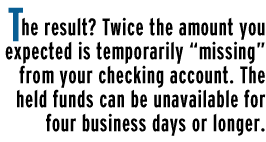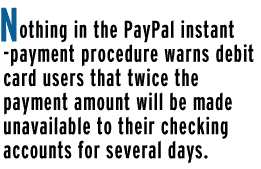| |||||||||

When Internet convenience costs a bundle
 Sending "instant payments" using PayPal.com may be a convenient way to send someone money. But you might be surprised to learn that PayPal may freeze your checking account for twice the amount of the payment you designate. Sending "instant payments" using PayPal.com may be a convenient way to send someone money. But you might be surprised to learn that PayPal may freeze your checking account for twice the amount of the payment you designate.Phillip Niebrugge of Decatur, Ill., found out the hard way that eternal vigilance is the price of electronic transactions. Niebrugge used PayPal in February to send payments for a few hundred dollars each to various vendors. To his surprise, a physical check that he'd written on his checking account then bounced, although Niebrugge knew he had sufficient funds to cover the check Only after asking his credit union to investigate did he discover the problem: PayPal had placed a temporary "hold" on his checking account for each instant payment. In addition, an equal amount had been electronically withdrawn by PayPal to pay the recipient. Thus, double the amount Niebrugge had expected to pay had been made unavailable to his checking account, causing the bouncy check. Annette Summers, an accountant with Staley Credit Union of Decatur, confirmed in a telephone interview that PayPal's holds had caused the bounce. After Niebrugge gave credit union officials a signed authorization allowing me to inspect his financial statements, Summers sent me records showing the PayPal transactions. In one case, Niebrugge had authorized PayPal to send a payment for $285 from his checking account. Summers said PayPal had for some reason placed two different $285 holds on the account, even though there was a single $285 payment. The holds hadn't yet been released when the credit union examined the account.
The credit union itself rescinded the holds when Niebrugge brought them to light. Summers said the situation was resolved within about one week. Niebrugge, however, is still incensed about the overdraft in his checking account. He had voluntarily given PayPal his debit card number. But nothing in the PayPal instant-payment procedure warns debit card users that twice the payment amount will be made unavailable to their checking accounts for several days Niebrugge said no one at PayPal would help him, even after he sent five e-mails asking for support. "I basically got a standard reply that they put a hold on the (debit) card for the funds while the check clears," Niebrugge said. "They are effectively holding twice the funds to which they are entitled." Vince Sollitto, PayPal's vice president of corporate communications, confirmed that PayPal imposes a hold when a debit card is a member's "primary" bank card. The held amount is made unavailable to the user's checking account while an equal amount is deducted from the account to make the instant payment. The result? Twice the amount you expected is temporarily "missing" from your checking account. The held funds can be unavailable for four business days or longer. "Occasionally, what happens is customers link their debit card to their checking account," Sollitto said. "We go ahead and put a $200 hold on their debit card. They've now blocked $400 in their checking account." Sollitto said members preparing an instant payment can click a "more info" link to learn about PayPal's hold policy. This link, it turns out, is a small question-mark (?) button. When you click the button, a new window says, "Debit cards also draw on your checking account." But it doesn't say that this adds up to twice the payment amount. Customers, Sollitto suggested, should consider giving PayPal a credit card, not a debit card, to absorb holds. Or users should transfer money from their checking accounts to their PayPal accounts several days in advance of authorizing a payment. That way, he said, no hold is taken from a checking account. As always, you should carefully read everything about electronic transactions you make. In this case, though, even that might not have helped. Niebrugge will receive a free copy of Windows Me Secrets for calling attention to this problem. Brian Livingston's Wired Watchdog column appears at CNET News.com every Friday. Do you know of a problem affecting consumers? Send info to tips@BrianLivingston.com. He'll send you a book of high-tech secrets free if you're the first to submit a tip he prints.
today's guest |
|
|||||||||||||||||||||||
|
Send us news tips | Contact Us | Corrections | Privacy Policy |
|

